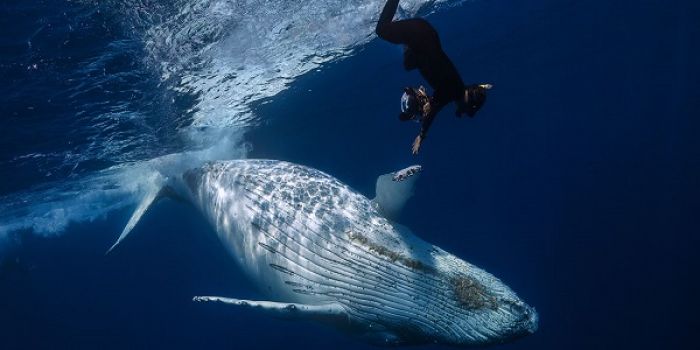Fantastic beasts: have a whale of a time in Tonga Featured

Fantastic beasts: have a whale of a time in Tonga
Swimming with majestic humpback whales in tropical waters beats all expectations
by: Jonathan Drennan
Tonga is often the neglected Pacific isle, pushed into the shade by its louder and more developed neighbours of Samoa and Fiji. Yet blow away the dust and you marvel at a tropical paradise that has been blessedly untouched by large-scale development.
It is a country of tiny islands, surrounded by a rich cobalt sea. Every year, for a few short months, humpback whales come to swim in its warm waters with their calves. Tonga remains one of the only places in the world you can swim with whales, and I had booked my ticket after waiting excitedly for a year.
I landed in pitch darkness at 2am from Australia, totally unprepared for the realities of Tonga’s one humble international airport. I had five hours to kill between flights, and mosquitoes were already circling ravenously in search of delectable white Irish flesh.
Tongan men and women got off the plane from Sydney and started handing out large bars of Australian chocolate to waiting relatives who proceeded to eat them ravenously, washing them down with large bottles of fizzy drinks.
Despite being surrounded by fresh fish and fruit, imported sugary food is often prized by Tongans, with tinned spam even considered a delicacy.
I was the only palangi – the name Tongans give to non-nationals at the airport. I had brought a rugby ball and soon made friends passing the ball for hours and chatting with the maintenance staff until the sun rose and I boarded the tiny plane to the island of Vava’u.
I was travelling primarily to swim with humpback whales, thanks to a friendship with a producer working in advertising in Sydney, who had become a full-time photographer. We had met over a timing plan and a year later he was showing me how to swim with whales.
On landing, I was given a lift to my accommodation on the back of a pick-up truck with locals on a bed of coconut leaves. There was no fee and I didn’t ask for a lift, the men in the car just assumed I needed one and so offered it. These acts of random kindness are typical in Tonga, where locals will always greet you as you walk past or offer a lift if you look in need of one.
In many ways it resembles a sunnier, warmer Irish seaside town in the 1950s. Indeed, the Catholic Church still completely dominates life, and locals will go to church two to three times a week, with work of any kind being illegal on Sundays.
Strict rules
Life on a whale swimming boat starts early, with the boat leaving at 7am while the sun creeps up. I walked to the local jetty every morning, being far more terrified of the snarling local dogs than I ever was of the huge mammals that I would be swimming above every day.
The rules for swimming with whales in Tonga are strict . Only four people are allowed in the water with the whales at any one time, and their behaviour is monitored constantly to make sure that they are not feeling threatened or disturbed.
The first time you enter the water and see a humpback whale and its baby calf, your brain can’t quite process what it is seeing. I found myself pinching my arms frequently, trying to force my brain to engage with what my eyes were seeing.
The most tranquil and beautiful moments are when the mother settles and relaxes below the surface, while her calf comes up to the surface for air every few moments, glances at you with its large eyes before going down again to rest against its mother.
Often the calf will want to play and will swim relatively closely, pirouetting and twirling its body like an out-of-control ballerina, but it will always place its fin out to measure where you are, taking care not to hit you.
Often mothers and calves are swimming with larger escorts that help them to navigate the sea and protect them from the attentions of other males. Rarely, we would see them settle, but often with a seemingly small flicker of their tails, they glided through the ocean, ushered by the large escort far beyond us, a mother and child reluctantly dragged from the playground by an impatient father.
It felt at times as if we were small one-seater aircraft, hovering closely surrounded by huge 747s that were working with skilled air traffic controllers in tandem. The whales were often curious and swam close enough to gaze at us before returning deep below.
Touch rugby
The days in the water were long, ending at 4pm. After a day of swimming solidly with large mammals, I wanted to curl up and sleep on my Tongan mat, but I chose instead to put my rugby ball to good use. Beside my bungalow was a rugby pitch, the full-time ground staff being a collection of pigs and cows.
At 6pm every night, the village would gather en masse to play touch rugby. It was one touch and then possession was turned over to the other team. Tongans and little children played, and the children were encouraged to be involved in the game.
I played most nights, bewildered and bamboozled by their speed, skill and sleight of hand. I walked home in the pitch dark, with shining stars and a clear milky way lighting my path.
Sunday arrived and as predicted the whole town shut down, including restaurants. I joined the locals in the local church, a small hut at the bottom of a mud track. All the congregation were smartly dressed in pressed shirts and a ta’ovala, which is a piece of straw matting worn for formal occasions.
The service is long and involved. The minister shouts loudly at the congregation for the sins during the week, and they compensate by singing in the most beautiful harmonies you have ever heard.
On the penultimate day in the water, we swam with false killer whales, a member of the oceanic dolphin family. They swam around and beside us, with one jumping out of the water metres in front of me before leaving us speedily.
We hauled ourselves out of the water exhausted and had no words available. We had shared the warm, tropical waters for a week with beautiful, majestic creatures; there was nothing more that needed to be said.
The friendly isles of Tonga, where the welcome is warm, whether on land or sea.
-Irish Times



